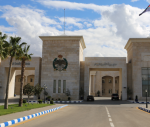You are here
America’s neo-political discourse on Jerusalem
Jan 31,2018 - Last updated at Jan 31,2018
Addressing the Knesset on January 22, 2018, US Vice President Mike Pence avowed that the US embassy would be open in Jerusalem towards the end of 2019, thus reiterating his administration’s recognition of Jerusalem as the legitimate capital of Israel. Before that, President Donald Trump’s decision was foreshadowed by many pro-Israel activists, but leaders of the Arab-Muslim Middle East and Palestinians harshly criticised it. Paradoxically, the international community (including the US until relatively recently) does not recognise Jerusalem as the capital of Israel. And like other countries, the US has kept its embassy in Tel Aviv, roughly about an hour-drive away from Jerusalem.
Without doubt, moving the embassy would cause substantial impairment to the US’ credibility as a fair-minded peacebroker between the two parties to the conflict, the Israelis and the Palestinians. The move has the potential of undermining confidence from Palestinians and Arab countries, and, this way, the US may not remain an even-handed mediator to initiate peace in the Arab-Muslim Middle East. Even the apparently inconsequential changes of Jerusalem’s current situation on the ground may have the impact of inspiring hostility, aggression, pugnaciousness and violence.
The eyes of many Americans were and are wide open on President Trump, to see if he would stick to his campaign promise, moving the embassy, because if he does, he will be long remembered for his act. However, should not America treat Israel as all other nations are treated? Be the answer as it may, if he does not, he will be remembered as just another US president who made a promise he did not succeed to accomplish, which would generate enormous dissatisfaction among those who voted for him against Mrs Clinton.
President Trump is not, however, the only White House resident to declare his intentions to move the embassy; Bill Clinton and George W. Bush also pledged to move it, only to desert the gist once in the White House. The Congress approved, in 1995, the backing and relocation of the embassy to Jerusalem by 1999. But the law allowed presidents to sign continuous waivers to equivocate the relocation. Ever since this waiver was used to avoid conflict with the on-going peace talks.
Recognising Jerusalem as the capital of Israel was not, perhaps, grave enough; Trump later asserted that entire Jerusalem is a non-negotiable pact in favour of Israel, simultaneously accentuating that the US economic aid to the Palestinians would be suspended if they abandon peace talks. Nevertheless, is such a dialogue all that it takes to solve the decades-old Palestinian dilemma?
The existence of a free, independent (and sovereign) Palestinian state must be solely predicated on having a capital in Jerusalem; first, because it is the law; second, because it has been occupied; third, because of the religious shrines holy to the Muslims and Christians alike. Along this path, the American administration has an arduous job, proving that it can still be a dependable and trustworthy peace broker.
In conclusion, Pence made it unblemished clear when he told the Israelis following his recent visit to the region: “I am here to convey one simple message. America stands with Israel. We stand with Israel because your cause is our cause, your values are our values, and your fight is our fight.” Nothing can be more alarming and disquieting to the entire region than this neo-political rhetoric!













